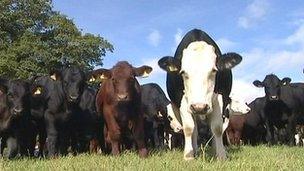Russia to lift 26-year ban on British beef and lamb
- Published

Russia has agreed to lift a 26-year ban on importing British beef and lamb, its government has said.
British farmers had been prevented from exporting to the Soviet Union, and later Russia, following the first BSE outbreak in 1986 in the UK.
Russia kept the ban despite it being lifted worldwide in 2006.
The government expects an official confirmation from Russia shortly, said a statement.
Prime Minister David Cameron raised the issue during a visit to Russia last year.
"British food is recognised around the world for using quality ingredients, for rigorous production standards, and for reliable traceability. This deal is further evidence of international confidence in what British producers have to offer," said Environment Secretary Owen Paterson regarding the latest agreement.
"Our food exports are booming, recently topping £10bn a year, and this government is doing all it can to open up markets abroad," he said, adding that UK food and drink exports rose by 9% to £18.2bn last year.
A worldwide ban on British live cattle, meat and products was lifted by the EU in 2006. However, Russia kept the ban in place amid fears over the threat of Bovine Spongiform Encephalopathy (BSE).
According to the BBC's Moscow correspondent Daniel Sandford, the continued restrictions have been a sore point between the two countries.
The announcement of the lifting of the ban came during a visit to the Russian capital by the UK's chief veterinary officer Nigel Gibbens, but seemed to take the British delegation by surprise, our correspondent says.
It will be welcomed by UK farmers keen to sell their products to Russia's fast-growing market, where there is potential for selling lamb and beef and also live animals to farms.
- Published3 June 2004
- Published8 March 2006